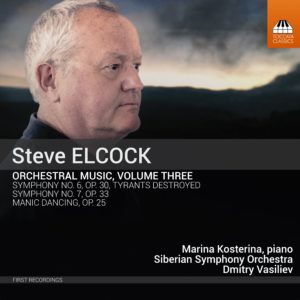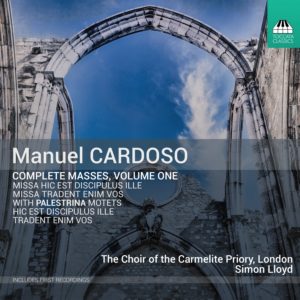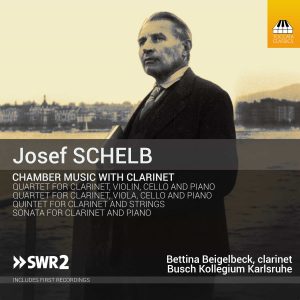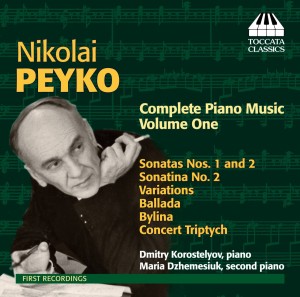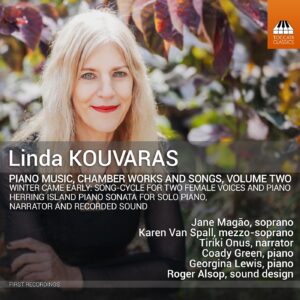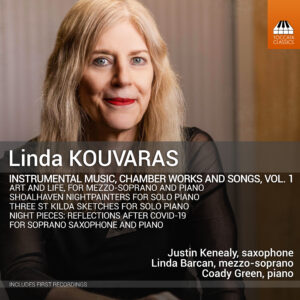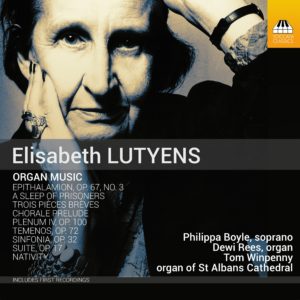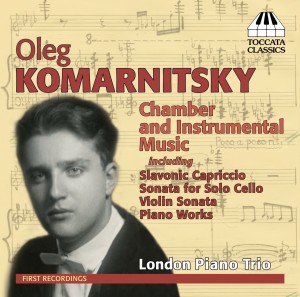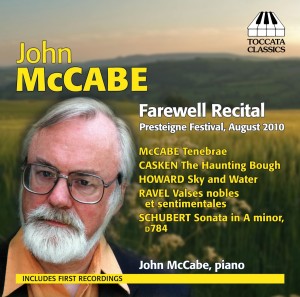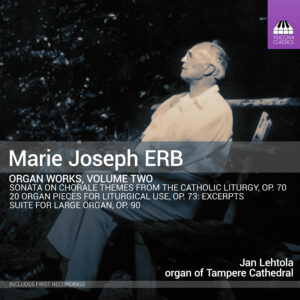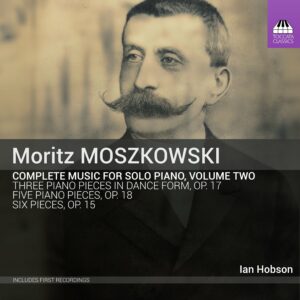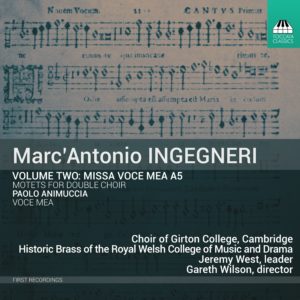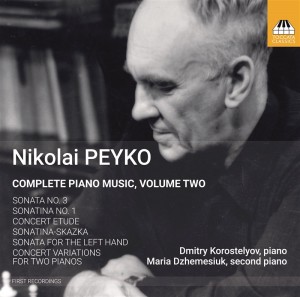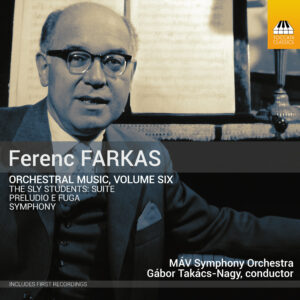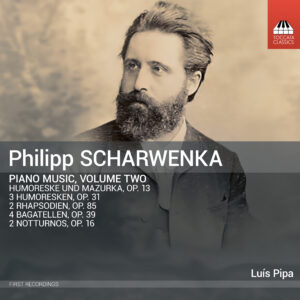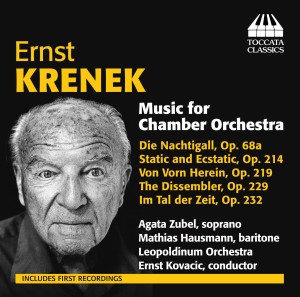Search Results for "Space Wolf: The First Omnibus mp3 torrent" – Page 13
Steve Elcock: Orchestral Music, Volume Three
This third volume of orchestral music by the Anglo-French composer Steve Elcock (b. 1957) features two symphonies and a quasi-concerto. Over the course of its two movements, the Sixth Symphony, which bears the title Tyrants Destroyed, moves from grief to outrage, rising to a grimly triumphant conclusion. The one-movement Seventh – with some of its material derived from the words of a song Elcock heard in a dream – runs a gamut of emotion, from anger to heartbreak, in its impassioned narrative. Manic Dancing, a piano concerto in all but name, inhabits a complex world of driving rhythms, nostalgic flashbacks and hectic dance music – buoyant and good-natured, like Martinů on speed.
Marina Kosterina, piano (Tracks 8-10)
Siberian Symphony Orchestra
Dmitry Vasiliev, conductor
Manuel Cardoso: Complete Masses, Volume One
Manuel Cardoso (1566–1650) was one of the most important composers of the golden age of Portuguese polyphony around the turn of the seventeenth century. But history has not been kind to him: the 1755 Lisbon earthquake that ruined the Convento do Carmo, where he spent most of his working life, also resulted in the loss of the only attested image of the composer and a good deal of his music – and much of that which survived has been neglected, his Masses included. This series will shed long-overdue light on these forgotten masterpieces, beginning with two ‘parody’ Masses, so called because they are based on existing music, in this instance two Palestrina motets.
The Choir of the Carmelite Priory, London
Simon Lloyd, director
Josef Schelb: Chamber Music with Clarinet
The Karlsruhe-based Josef Schelb (1894–1977) is one of the better-kept secrets of twentieth-century German music. His output was substantial: he lost most of his early music in a bombing raid in 1942, but – as if to make up for lost time – wrote some 150 more works after that. These four, for clarinet in various chamber combinations, show his music emerging from the influence of Hindemith and Berg and developing a freewheeling energy, contrapuntal command and rhythmic charge of its own – often animated by a touch of devilish humour.
Busch Kollegium Karlsruhe
Bettina Beigelbeck, clarinet
Yasushi Ideue, violin (Tracks 5–7, 12–15)
Ayu Ideue, violin (Tracks 5–7)
Wolfgang Wahl, viola (Tracks 5–11)
Gabriela Bradley, cello (Tracks 8–11)
Bernhard Lörcher, cello (Tracks 1–7)
Manfred Kratzer, piano (Tracks 1–4)
Nikolai Peyko: Complete Piano Music, Volume One
The Russian composer Nikolai Peyko (1916-95) studied with Myaskovsky at the Moscow Conservatoire, where he later became Shostakovich's teaching assistant and then an important teacher in his own right. Peyko's piano music shares Shostakovich's fondness for irony and Prokofiev's for driving march-rhythms and playful good humour and, as with so many Russian composers, the sound of bells can often be heard. Each of the two CDs in this complete recording of his piano music ends with one of Peyko's two works for two pianos — the first time that any of this music has been heard in its entirety.
Dmitry Korostelyov, piano
Maria Dzhemesiuk, piano
Linda Kouvaras: Piano Music, Chamber Works and Songs, Vol. 2
As with many other Australian composers, the music of Linda Kouvaras (b. 1960) has a strong sense of space, expressed in lyrical, elegiac melodic lines that soar over freewheeling piano textures. The two substantial works on this second Toccata Classics album of her music demonstrate her concern that her compositions engage with the outside world: the epic Herring Island Piano Sonata adds narrator and recorded sound – not least of local birds – to the piano to bring alive the Indigenous history of a small hidden paradise in downtown Melbourne, and the poems set in Winter Came Early reveal a mother and daughter coming to terms with a fatal diagnosis of cancer
Coady Green, piano
Georgina Lewis, piano
Jane Magão, soprano
Karen Van Spall, mezzo-soprano
Tiriki Onus, narrator
Roger Alsop, sound design
Linda Kouvaras: Instrumental Music, Chamber Works and Songs, Volume One
As with many other Australian composers, the music of Linda Kouvaras (b. 1960) has a strong sense of wide-open spaces, expressed in lyrical, elegiac melodic lines that soar over freewheeling Lisztian piano textures and atmospheric echoes of French Impressionism. In this first album of a series presenting all of her instrumental works, chamber music and songs written since 1991, she also addresses two major contemporary issues, with a duo for saxophone and piano exploring the human response to the COVID-19 pandemic and a song-cycle confronting domestic violence from a woman’s viewpoint.
Justin Kenealy, saxophone
Linda Barcan, mezzo-soprano
Coady Green, piano
Elisabeth Lutyens: Organ Music
The organ music of Elisabeth Lutyens (1906–83) presents a meeting of contrasts: it can at the same time be both angular and lyrical, and it spans an enormous dynamic range, from intimate delicacy to sheer, raw, hieratic power. Her reputation as one of Britain’s leading serial composers is belied, too, by the direct appeal, the range of colour and the narrative instinct of many of the pieces recorded here, most of them for the first time.
Philippa Boyle, soprano (Tracks 1, 6)
Dewi Rees, organ (Track 5)
Tom Winpenny, organ of St Albans Cathedral
Oleg Komarnitsky: Chamber and Instrumental Music
In his short life the Moscow-born Oleg Komarnitsky (1946-98) produced music in a wide variety of genres — orchestral, choral, chamber, instrumental and more, not least works for children — but almost none of it has been recorded before; it wasn't even heard outside Russia before 1996. Komarnitsky's music is accessible and lyrical, with the Slavic melancholy which colours the string works here (apparently all that survives of his chamber music) balanced by the buoyant and innocent humour of his piano music, with its echoes of Prokofiev and Shostakovich.
London Piano Trio, piano trio
Robert Atchison, violin
David Jones, cello
Olga Dudnik, piano
John McCabe: Farewell Recital
On 29 August 2010, at the Presteigne Festival on the Welsh borders, John McCabe gave his last public piano recital, bringing to an end a career as solo pianist that had lasted half a century. McCabe — born in Liverpool in 1939 and a composer-pianist in the tradition of Beethoven and Rachmaninov — has always championed the music of his contemporaries alongside his own and that of the masters of the past, and this farewell recital included two works by friends and colleagues and his own grandiose Tenebrae.
John McCabe, piano
Marie Joseph Erb: Organ Works, Volume Two
The enormously prolific Marie Joseph Erb (1858–1944) has somehow escaped the attention of posterity, although the quality of his music is on a par with contemporary organist-composers whose works are far better known. Erb’s long life – he heard Berlioz conduct in 1863 and was still composing 80 years later – was focused on Strasbourg, where he was active as pianist, organist and professor, though he had studied in Paris, with Fauré, Gigout, Saint-Saëns and Widor, and later with Liszt in Weimar. This second Jan Lehtola/Toccata Classics album devoted to his organ music sandwiches six short pieces intended for liturgical use between two monumental works; indeed, in its combination of architectural magnificence and emotional intensity, the Sonata on Chorale Themes of the Catholic Liturgy may be one of the finest of all organ sonatas.
Jan Lehtola, organ of Tampere Cathedral
Moritz Moszkowski: Complete Music for Solo Piano, Volume Two
Although Moritz Moszkowski (1854–1925) wrote a considerable quantity of piano music, only a single piece, ‘Étincelles’, made it into the repertoire, not least because Horowitz enjoyed playing it. The early works on this second instalment in Ian Hobson’s survey of Moszkowski’s complete music for solo piano reveal a debt to Mendelssohn and Schumann, but the effortless craftsmanship heard here already justifies a later remark of Paderewski’s: ‘After Chopin, Moszkowski best understands how to write for the piano, and his writing embraces the whole gamut of piano technique’. Most of the pieces in Opp. 15 and 18 are attractive salon miniatures, but the Three Piano Pieces in Dance Form, Op. 17, are extended Lisztian essays that showcase Moszkowski’s mastery of the keyboard and his command of form.
Ian Hobson, piano
Marc’Antonio Ingegneri: Volume Two: Missa Voce Mea A5, Motets for double choir
The Cremonese composer Marc’Antonio Ingegneri (c. 1535/36–92) is chiefly remembered as the teacher of Claudio Monteverdi, while, for well-nigh 500 years, his own achievements were left to sit in the shadows. This second in a series of pioneering recordings from the Choir of Girton College, Cambridge, reveals Ingegneri to have been one of the masters of his age, writing music of breathtaking richness and beauty: the works heard here combine learned, intricate counterpoint with the kind of sheer sonic thrill that brings a shiver of physical excitement. It is, of course, religious music, but it is also extraordinarily passionate, to a degree not previously heard, nor for centuries to come, until the rise of the great Romantic choral works.
Choir of Girton College, Cambridge (Tracks 1–3, 5–8, 10, 12–14)
Historic Brass of the Royal Welsh College of Music and Drama (Tracks 1, 3–14)
Jeremy West, leader
Gareth Wilson, director
Nikolai Peyko: Complete Piano Music, Volume Two
The Russian composer Nikolai Peyko (1916-95) studied with Myaskovsky at the Moscow Conservatoire, where he later became Shostakovich's teaching assistant and then an important teacher in his own right. Peyko's piano music shares Shostakovich's fondness for irony and Prokofiev's for driving march-rhythms and playful good humour. Each of the two CDs in this complete recording of his piano music ends with one of Peyko's two works for two pianos, in this instance the wildly exciting Concert Variations — the first time that any of this music has been heard in its entirety.
Dmitry Korostelyov, piano; Maria Dzhemesiuk, second piano;
Ferenc Farkas: Orchestral Music, Volume Six
Ferenc Farkas (1905–2000) is often viewed as a gifted miniaturist, sifting through Baroque and popular Hungarian sources to produce glittering orchestral dances of infectious energy. That Farkas does indeed exist, as in the suite from the ballet The Sly Students, but this album also shows an entirely different side to his musical personality. His Preludio e Fuga finds him experimenting with dodecaphony – but he offered a caution: ‘In the twelve-tone theme of the fugue, I did not use Schoenberg’s orthodox model but a softer form, more euphoric, with a rounder and more attractive sonority – I am thinking of works by Luigi Dallapiccola or […] Frank Martin’. His only symphony was a victim of Communist orthodoxy, so severely criticised at Party meetings that Farkas shelved the score. This first complete recording reveals a work that is both big-boned and big-hearted – one of the finest of all Hungarian symphonies.
MÁV Symphony Orchestra
Gábor Takács-Nagy, conductor
Philipp Scharwenka: Piano Music, Volume Two
As composer, pianist and educationalist, the Prussian Philipp Scharwenka (1847–1917) was one of most highly respected musicians of his day, although his star faded soon after his death. His music – more conservative and classical in orientation than that of his pianistcomposer brother, Xaver – sits somewhere between Chopin and Brahms, with echoes of Schubert and Schumann. This second instalment of a survey of his piano music is intended to put these immediately attractive works before the public once again – for the first time in over a century.
Luís Pipa, piano
Ernst Krenek: Music for Chamber Orchestra
These five works for chamber orchestra by Ernst Krenek (1900-91) were written between 1931 and 1979 — both before and long after Krenek abandoned Hitler's Austria for California. They demonstrate that serial music, in capable hands, does not have to abandon the virtues of more conservative idioms: the emotions embraced here range from translucent lyricism, via powerful dramatic utterance, to uneasy existentialist humour.
Agata Zubel, soprano
Mathias Hausmann, baritone
Leopoldinum Orchestra, chamber orchestra
Ernst Kovacic, conductor
Stay In the Know
JOIN THE TOCCATA NEWSLETTER
"*" indicates required fields
By visiting our site, you agree to our privacy policy regarding cookies, tracking statistics, etc.
